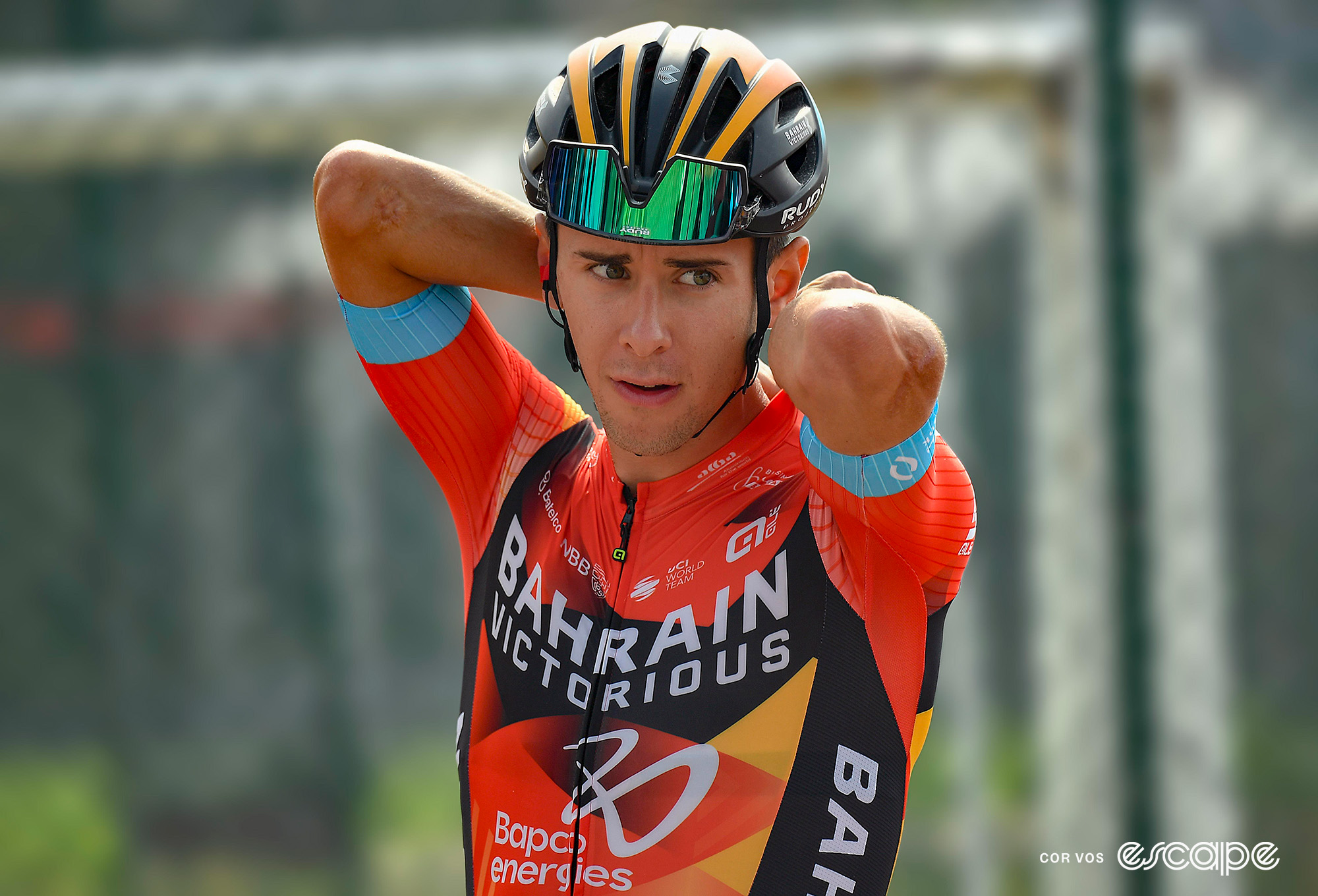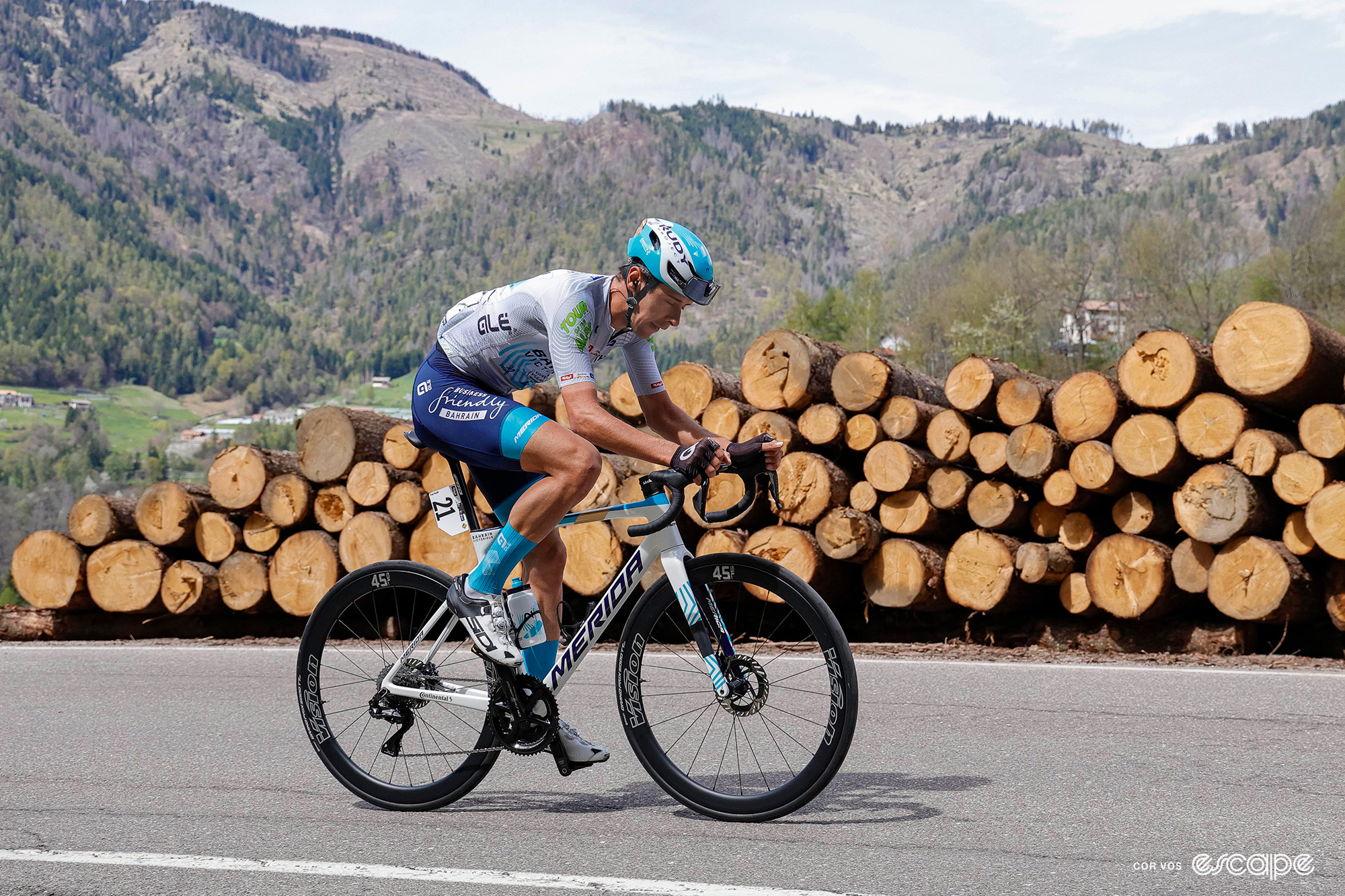On the morning of Wednesday, May 8, before the start of the Giro d'Italia's stage 5, the CPA riders' union posted a video with a rider calling for fans to behave in a respectful way toward both the riders and, by extension, the race itself.
A fairly humdrum video, not the first of its genre, and a small amount of work that could potentially provide a large benefit if it stops some moron from sticking their phone out in the way of the peloton as they attempt to get a selfie.
The only issue with the video, which has since been deleted, is the person the CPA had enlisted to call on roadside fans to #RespectTheRiders was Bahrain Victorious' Antonio Tiberi, who shot and killed a cat in cold blood with an air rifle near his San Marino home in June 2022.

It caused quite the incident at the time, as it turned out the cat belonged to the former San Marino joint Head of State Federico Pedini Amati.
The internet contains no shortage of cat GIFs, and many were posted underneath the video of Tiberi. A cat looking at phones before recoiling in horror. A cat hiding behind a bathroom door. A cat hissing at the camera. Alternatively, numerous people replied with their own version of the #RespectTheRiders hashtag: #RespectTheCats.
Before long, the video had been pulled on Twitter. We asked the CPA why the video had been deleted and they told us:
"Once we saw the negative comments, we thought to delete it to protect the rider and ask him after the stage if he agrees we keep it up. This gesture is for the riders protection."
The CPA's choice of Tiberi for a public-safety campaign is slightly baffling, but that choice – and the reaction to it – highlights a larger issue: how do fans balance their understandable questions about Tiberi's character against keeping open a space for him, or any rider, to honestly rehabilitate themselves after having done something morally offensive?
A horrific act, a muted apology
Let's be clear: shooting a cat (fatally or no) is very bad. But fans' generally hostile response to Tiberi is not due solely to the crime itself. Tiberi's excuse when questioned by local authorities was that he was trying to measure the gun's range. “I also admit that I (just as foolishly and unconsciously) tried to shoot a cat," Tiberi told Il Corriere della Sera. "And to my surprise I actually shot it. I had no intention of killing the animal. In fact, I was convinced the weapon was non-lethal."
When the news came to light in February 2023, after he was fined €4,000 by a court, he was quickly suspended by his then Trek-Segafredo team before they parted ways a couple of months later "after the rider’s actions during his suspension did not meet our criteria for a return to competition.”
As we reported at the time, apparently this was not only Tiberi's refusal to do his rehabilitation homework (we're imagining it Bart Simpson style, scrawling 'don't kill cats' on a blackboard line after endless line) but also an appearance on Italian TV that apparently didn't go down well with his now-former employers where Tiberi tepidly volunteered at a cat shelter and the woman running the place warned him not to hit his head on something before adding: “even if it would be good for you.”
After parting ways with Trek, last June Tiberi signed for Bahrain Victorious, a nation state whose human rights record has been officially described as "dismal", and so the welfare of cats hardly causes pause for thought. Twelve months on, he signed a new contract until 2027, the 22-year-old clearly having impressed his team.
"Antonio has already shown great promise this season," the team's managing director, Milan Erzen, said in the announcement. "He has been highly dedicated to improving his talent and has displayed great maturity, which is why he is our leader at this Giro."
Most rider renewal announcements do not contain notes on the athlete's maturity. It doesn't really matter if you're mature if you're winning. But clearly Bahrain Victorious are aware of the reputation carried by an athlete they've now signed up for a further three years (at least), and want to try and either draw a line under the episode, or believe, genuinely, that he has changed and is no longer the sort of person that jumps out of bed one morning and ends up shooting a random cat dead.
As for the CPA, fair enough, the union's responsibility is primarily to the riders it represents, and if the people running its social accounts could have started their day over again, they likely would have chosen anyone but Tiberi to be their video star.
The CPA pointed out the video remained live on Instagram and Facebook, where it had also been posted, because there weren't any negative comments. However, a brief glance at the Instagram post shows three comments, all of which could be described as not exactly lauding Antonio Tiberi.

But the CPA was aggressive – arguably overly so – in its own response to criticism. For those who had posted #RespectTheCats, such as one fan called Thomas Harvey, they found themselves in the CPA's own crosshairs and were quickly blocked by the union's Twitter account. We followed up with the CPA asking why these accounts had been blocked but at the time of writing have not received a reply.
An unclear path back
This mini-saga internet drama will likely play out again before long. People like cats and don't like seeing them shot dead. It raises an interesting question of what exactly the rest of Tiberi's career looks like, and Bahrain Victorious at the very least deem that it could be a long one. What is his real level of remorse? Some of the evidence we have, like apparently not completing his rehab homework that was part of his suspension, hint at an answer. But maybe his regret is deep and he's not the same guy anymore. People can make mistakes, even big ones like shooting a cat dead. But the right response can sometimes undo big fuck-ups.
What would he have to do to prove to people he's changed? For some it will never be enough and he'll always be a pariah. Riders such as Gianni Moscon have become almost completely ostracised, whose 'Controversy' dropdown is the largest section of his Wikipedia page, and the Italian has bounced from Sky to Astana to Soudal-Quick Step and today exists largely on the fringes of the sport, occasionally popping up in a breakaway and causing consternation between fans, media, and race organisers alike when there is more than a hint that he could end the day on the top step of the podium.
Similarly, and more contemporarily, there's the case of Quinn Simmons, who was suspended by Trek-Segafredo following a Twitter exchange (with Escape contributor José Been) deemed by the team (and many others) to be racially insensitive. Simmons was defiant his suspension was unwarranted and said in an interview that he had done nothing wrong. Since then, there is the understanding (although I'm not aware anyone has tried since then) that any further discussion of the topic will not be welcomed warmly by the rider, and so he also exists on the edges of the sport's mainstream, irrespective of his athletic potential.
And of course, there are examples outside of cycling. The Premier League footballer Kurt Zouma was filmed by his brother in 2022 kicking his own cat, for which he later apologised. But now, any time he touches a ball during a game, the opposition fans meow at him. This will likely happen until the day he retires.
Does Antonio Tiberi likely wish he'd never shot that cat dead? Absolutely. But if a rider doesn't feel they truly did anything wrong, it's hard for them to honestly try to make amends. Fans, in turn, don't see evidence of real remorse, and so no one ever moves on. The cat-killer comments keep coming, and Tiberi – along with the chance for repairing the rift with fans – retreats further with every exchange.
How much do these cyclists owe the sport and its fans to be who the majority of fans want them to be? How much should we care what they do off the bike? How much impact do these 'cancellations' impact the career a rider could have potentially had otherwise, and how much of the responsibility for that lays with that versus the rider and their choices, including to sincerely seek, or not, forgiveness? Finally, in the absence of clearly genuine penitence, how are fans to know a rider has changed?
These are uncomfortable questions for teams and riders, and ones for which fans will have an array of answers. Without resolution of those, Tiberi exists in a kind of purgatory; if there's a way back from it, it has yet to reveal itself.
Did we do a good job with this story?






